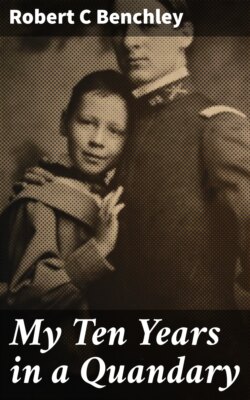Читать книгу My Ten Years in a Quandary - Robert C Benchley - Страница 15
На сайте Литреса книга снята с продажи.
Isn't It Remarkable?
ОглавлениеTable of Contents
On a recent page of colored reproductions of tomb-paintings and assorted excavations from holes in ancient Egypt there appears a picture of a goose with the following rather condescending caption:
Remarkably Accurate and Artistic Painting of a Goose from Pharaoh Akhenaten's Palace, Drawn 3300 Years Ago.
What I want to know is—why the "remarkable"? Why is it any more remarkable that someone drew a goose accurately 3300 years ago than that someone should do it today? Why should we be surprised that the people who built the Pyramids could also draw a goose so that it looked like a goose?
* * * * *
As a matter of fact, the goose in this particular picture looks more like a goose than that of many a modern master. Just what we think we are, in this age of bad drawing, to call an Egyptian painting "remarkably accurate and artistic" I don't know, but we have got to get over this feeling that anything that was done correctly in 1000 B. C. was a phenomenon. I say that we have got to get over it, but I don't know how.
People managed to drag along in ancient Egypt, from all that we can gather. They may not have known about chocolate malted milk and opera hats, but, what with one thing and another, they got by. And, presumably, every once in a while somebody felt like drawing a goose. And why not? Is there something exclusively twentieth century about the art of goose-drawing?
We are constantly being surprised that people did things well before we were born. We are constantly remarking on the fact that things are done well by people other than ourselves. "The Japanese are a remarkable little people," we say, as if we were doing them a favor. "He is an Arab, but you ought to hear him play the zither." Why "but"?
* * * * *
Another thing, possibly not exactly in this connection, but in line with our amazement at obvious things. People are always saying: "My grandfather is eighty-two and interested in everything. Reads the paper every day and follows everything."
Why shouldn't he be interested in everything at eighty-two? Why shouldn't he be especially interested in everything at eighty-two? What is there so remarkable about his reading the paper every day and being conversant on all topics? If he isn't interested in everything at eighty-two when is he going to be? (I seem to be asking an awful lot of questions. Don't bother answering them, please.)
It is probably this naive surprise at things that keeps us going. If we took it for granted that the ancient Egyptians could draw a goose accurately, or that Eskimos could sing bass, or that Grandpa should be interested in everything at eighty-two, there wouldn't be anything for us to hang our own superiority on.
And if we couldn't find something to hang our own superiority on we should be sunk. We should be just like the ancient Egyptians, or the Eskimos, or Grandpa.
